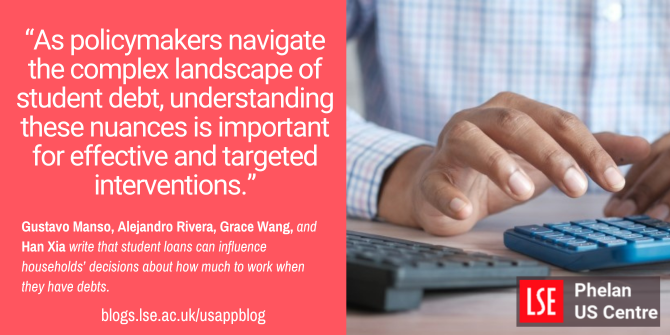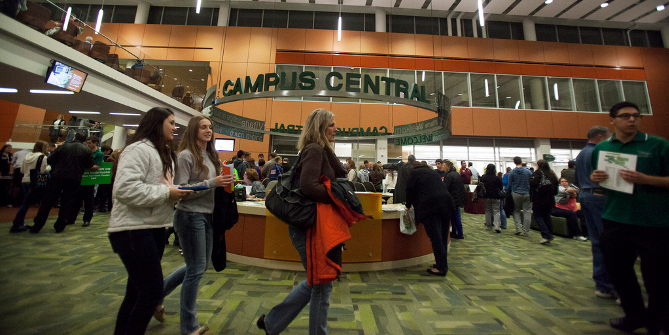


 When households are faced with large debts that they may be able to avoid through declaring bankruptcy, this can influence their incentives to work to service these debts. In new research, Gustavo Manso, Alejandro Rivera, Grace Wang, and Han Xia look at the influence of student loans – a debt which generally cannot be avoided – on decisions about work. They find that when student loans are a high proportion of a household’s debt, then households’ reduced desire to work come later, and are not as strong.
When households are faced with large debts that they may be able to avoid through declaring bankruptcy, this can influence their incentives to work to service these debts. In new research, Gustavo Manso, Alejandro Rivera, Grace Wang, and Han Xia look at the influence of student loans – a debt which generally cannot be avoided – on decisions about work. They find that when student loans are a high proportion of a household’s debt, then households’ reduced desire to work come later, and are not as strong.
Student loans have undeniably become a central component of household debt in recent decades, with volumes soaring to $1.6 trillion, an almost tenfold increase since the early 1980s. The impact of this surge has been extensively explored by researchers, revealing a common narrative – the burdensome consequences of student debt on personal and professional life paths such as delayed homeownership, reduced small business formation, lower graduate school enrollment, and poor labor market outcomes, amongst others.
Student loans’ positive effects on incentives to work.
In our work, we provide an additional perspective. Contrary to the prevailing narrative, we propose one of the first theoretical frameworks that explores a previously overlooked positive aspect of student loans: their potential to overcome the tendency of debts to reduce people or household’s incentive to work – known as the “debt overhang”. Moreover, we delve into the intricacies of this phenomenon, considering various repayment options from policymakers such as the Income Driven Repayment (IDR) plans and designated student loan forgiveness.
Our dynamic model features a risk-averse household navigating the complexities of borrowing from the credit market while working in a way that best services their borrowing. In the first part of our analyses, we confirm prior findings and establish that household indebtedness leads to a debt overhang problem. A debt overhang arises because households decide to not to take on additional work as they anticipate being able to declare bankruptcy in the future, thereby making that work seem unnecessary. This mechanism stems from the limited liability protection enjoyed by US households and the associated common practice of discharging debt in bankruptcy.
Enter student loans, particularly federal student loans dominating the market, which cannot be eliminated through bankruptcy. Unlike other forms of consumer debt, student loans create a unique dynamic. Because they generally cannot be avoided, they remove the perceived benefits for households of strategically working less, correcting their disincentive to work. This is a key finding of our model – the corrective effect of student loans.
Our model shows that having student loan debts delays the debt overhang – the belief that working more to pay off debt is unnecessary. When student loans are a large portion of household debt, the debt overhang does not kick in until a later stage and when it does occur, households’ desire to work less is not as pronounced. Both these effects show how student loans can address the debt overhang problem.

Photo by Towfiqu barbhuiya on Unsplash
Income Driven Repayment plans and incentives to work
Moving beyond our baseline findings, we explore how student loan repayment options, especially Income Driven Repayment (IDR) plans, impact the corrective effect of student loans. While IDR plans have gained regulatory attention, our analysis uncovers a potential unintended consequence – the setback effect.
Unlike the standard repayment plan, IDR plans set payments as a proportion of borrowers’ discretionary income and forgives the remaining principal after 20-25 years of continuous payments. However, this proportion is determined formulaically and does not change with students’ borrowing amount or outstanding balance. This creates an opportunity for borrowers to “discharge” student loans in a way, partially undoing the corrective effect of student loans. The setback effect becomes more pronounced as student loans make up a larger part of household debt, revealing a delicate balance in the decision-making process for policymakers.
Unintended consequences of student debt relief
Calibrating our model to real-world IDR take-up rates, we predicted that the setback effect would not completely offset the corrective effect of student loans; analyses using data from the 1997 National Longitudinal Survey of Youth confirm this. Having a larger proportion of student loans among overall household debt is associated with a less severe debt overhang, validating the delayed and reduced effects of student loan debt we predicted.
Our findings have significant policy implications, particularly considering recent regulatory efforts, such as the student loan relief program proposed by the Biden administration in 2022. Adjustments to Income Driven Repayment plans, including a lower repayment proportion and a shortened waiting period until loans are forgiven, may inadvertently amplify the setback effect, potentially undermining the government’s initiative to relieve households from the burden of debt.
Our theoretical framework, supplemented by evidence, sheds light on the crucial role of student loans in mitigating household debt overhang. As policymakers navigate the complex landscape of student debt, understanding these nuances is important for effective and targeted interventions.
- This article is based on the paper, ‘Student Loans and Labor Supply Incentives’ invited for dual submission at the Journal of Financial Economics, and also available at SSRN.
- Please read our comments policy before commenting.
- Note: This article gives the views of the author, and not the position of USAPP – American Politics and Policy, nor the London School of Economics.
- Shortened URL for this post: https://bit.ly/3ux2Ept






